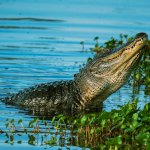National Alligator Day Date in the current year: May 29, 2026
 National Alligator Day is celebrated annually on May 29. It was created by Wild Florida, an airboat, gator and drive-thru safari park in Kenansville, to educate the general public about alligators and recognize the importance of these widely misunderstood reptiles for ecosystems.
National Alligator Day is celebrated annually on May 29. It was created by Wild Florida, an airboat, gator and drive-thru safari park in Kenansville, to educate the general public about alligators and recognize the importance of these widely misunderstood reptiles for ecosystems.Alligators, also known as simply gators, are large reptiles that make up the subfamily Alligatorinae, one of the two subfamilies in the family Alligatoridae, the other being Caimaninae (caimans). There are several extinct alligator species known from fossil remains and only two extant species of alligator: the American alligator and the Chinese alligator.
The American alligator, also known as the common alligator, is native to the Southeastern United States. It inhabits freshwater environments in Florida, Louisiana, and parts of Georgia, Alabama, Mississippi, South and North Carolina, Texas, Oklahoma, and Arkansas. A small population of the American alligator is also found in Mexico. The largest reptile in North America, it used to be endangered as a result of overhunting and poaching. However, thanks to conservation efforts the American alligator was pronounced a species of least concern in 1987.
The Chinese alligator, also known as the Yangtze alligator, is endemic to China. It is a critically endangered species whose range is restricted to a portion of Anhui Province in the Yangtze River valley, with occasional sightings reported in the provinces of Jiangsu and Zhejiang. The population of the Chinese alligator has declined dramatically due to habitat loss and human killing; conservation efforts include breeding Chinese alligators in captivity and releasing them into the wild.
Alligators are large animals (the American alligator is larger than the Chinese alligator) that are apex predators in their ecosystems. Young alligators eat crustaceans, fish, insects, snails, and worms, whereas adult alligators prey on large fish, turtles and other reptiles, birds, and various mammals (coypu, muskrat, deer). Large alligators can even ambush dogs, bears and cougars. However, unlike large crocodiles, they don’t normally regard humans as prey and only attack if provoked to defend themselves.
By the way, the level of aggressiveness is not the only difference between crocodiles and alligators, who are often confused with each other. Alligators have wide (U-shaped) snouts, and when they close their mouths, only the upper teeth are left visible, whereas crocodiles have more pointed (V-shaped) snouts, and when they close their mouths, both the upper and lower teeth are visible.
Wild Florida established National Alligator Day in 2021 to recognize the importance of alligators in Florida’s ecosystems and help people understand why alligators are such incredible animals. You can celebrate this amazing holiday by learning more about alligators and sharing the facts you’ve learned with others, visiting a zoo, aquarium or wildlife park that has alligators, donating to a conservation organization that works to save the Chinese alligator, and spreading the word on social media with the hashtag #NationalAlligatorDay.
- Category
- Ecological Observances, Unofficial Holidays
- Country
- USA
- Tags
- National Alligator Day, environmental observances, observances in the US, unofficial holidays, aliigators